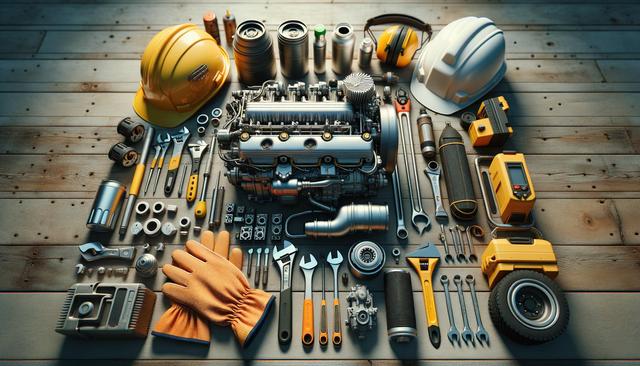The Importance of Diesel Equipment Maintenance Training
Diesel-powered equipment plays a vital role in industries such as construction, mining, agriculture, and transportation. Proper maintenance is essential to keep these machines running efficiently and safely. Diesel equipment maintenance training equips individuals with the knowledge and hands-on skills to diagnose mechanical issues, perform routine servicing, and ensure compliance with safety standards. By understanding the inner workings of diesel engines and related systems, professionals can reduce downtime, extend equipment life, and avoid costly repairs. This training is not only beneficial for technicians but also for operators who interact with machines daily.
Training programs typically cover topics such as engine components, fuel systems, electrical diagnostics, hydraulic systems, and emissions control. These modules ensure that trainees are well-versed in both preventive maintenance and troubleshooting techniques. Moreover, they learn to interpret technical manuals and apply industry-standard practices. As diesel engines evolve with technological advancements, staying updated through continuous training becomes even more important. Investing in diesel maintenance education promotes operational efficiency and supports workplace safety protocols.
Core Skills Developed Through Training
One of the major advantages of diesel equipment maintenance training is the development of practical, job-ready skills. Participants gain experience in:
- Engine inspection and routine servicing
- Diagnosing and repairing mechanical and electrical faults
- Understanding system schematics and using diagnostic tools
- Maintaining hydraulic systems and powertrains
- Following environmental and safety regulations
These skills are essential for reducing the risk of equipment failure and ensuring smooth day-to-day operations. Trainees also become proficient in using tools like torque wrenches, multimeters, and electronic diagnostic software. The ability to identify subtle signs of wear or malfunction can prevent major breakdowns. Additionally, the training emphasizes documentation skills, teaching individuals to record maintenance activities accurately, which is crucial for audits and compliance.
Hands-on training modules simulate real-world scenarios, helping learners gain confidence and adaptability. Whether working in a fleet maintenance facility or on-site in rugged environments, the skills acquired through well-structured programs are directly applicable and highly valued by employers.
Understanding Preventive Maintenance Practices
Preventive maintenance is a key component of diesel equipment care. It involves regularly scheduled inspections and servicing to detect and resolve potential issues before they become serious. Training in this area focuses on the importance of routine checks and how to develop a maintenance schedule tailored to specific equipment types.
Key preventive maintenance tasks include:
- Checking fluid levels and replacing filters
- Lubricating moving parts
- Inspecting belts, hoses, and seals
- Monitoring tire pressure and tread wear
- Cleaning air intake and cooling systems
These practices improve fuel efficiency and performance while reducing the likelihood of unscheduled repairs. Training also covers how to use maintenance logs effectively to track servicing intervals and repair history. Understanding preventive maintenance helps organizations extend the life of their diesel assets and manage operational costs more efficiently.
Professionals trained in preventive care are better equipped to plan maintenance activities without disrupting workflows. They can also identify components nearing the end of their service life, allowing for timely replacements that prevent equipment downtime.
Safety and Environmental Compliance
Diesel equipment maintenance training places significant emphasis on safety and environmental responsibility. Proper maintenance reduces emissions, minimizes fuel wastage, and ensures that machines operate within legal safety parameters. Trainees learn about environmental regulations, including those related to exhaust systems and fuel handling.
During training, participants explore topics such as:
- Safe handling of fuels and lubricants
- Proper disposal of hazardous materials
- Use of personal protective equipment (PPE)
- Identifying and mitigating potential hazards
- Understanding emissions standards and compliance procedures
Developing a safety-first mindset not only protects workers but also helps companies avoid fines and reputational damage. Maintenance errors can lead to accidents, environmental spills, or equipment fires. Therefore, training includes emergency response protocols and risk assessment strategies. By integrating safety education into technical training, programs ensure that maintenance personnel are well-prepared to uphold industry standards and contribute to safer work environments.
Employers benefit from having a skilled workforce that recognizes the importance of sustainability and follows environmentally sound practices, which is increasingly a priority across all sectors.
Career Opportunities and Advancement
Completing diesel equipment maintenance training can significantly expand career prospects. From entry-level technician roles to specialized positions in diagnostics and fleet management, the training opens doors to various job paths. Skilled technicians are in demand across industries, and employers value candidates who have completed certified training programs.
Career paths may include:
- Diesel mechanic or service technician
- Heavy equipment operator with maintenance expertise
- Fleet maintenance supervisor
- Field service technician
- Service advisor or technical trainer
Some professionals use their training as a foundation to pursue further education or certifications in areas such as hydraulics, electrical systems, or emissions technology. Others may move into leadership roles, overseeing maintenance teams or managing service operations. The demand for skilled diesel maintenance professionals continues to grow, driven by infrastructure development, logistics expansion, and increased mechanization.
Additionally, trained individuals often enjoy job stability and competitive wages. They also gain the satisfaction of working in roles that are essential to keeping critical operations running smoothly. As technology evolves, ongoing training ensures continued relevance and adaptability in the field.
Conclusion: Building a Skilled and Sustainable Workforce
Diesel equipment maintenance training is a crucial step for anyone looking to operate and maintain heavy machinery effectively. It not only enhances technical proficiency but also promotes safety, environmental stewardship, and career growth. Whether you’re entering the field for the first time or seeking to upgrade your skills, comprehensive training programs offer the tools and knowledge needed to succeed. In a landscape where well-maintained equipment is essential to productivity and safety, investing in training is a smart move for individuals and employers alike.




Leave a Reply